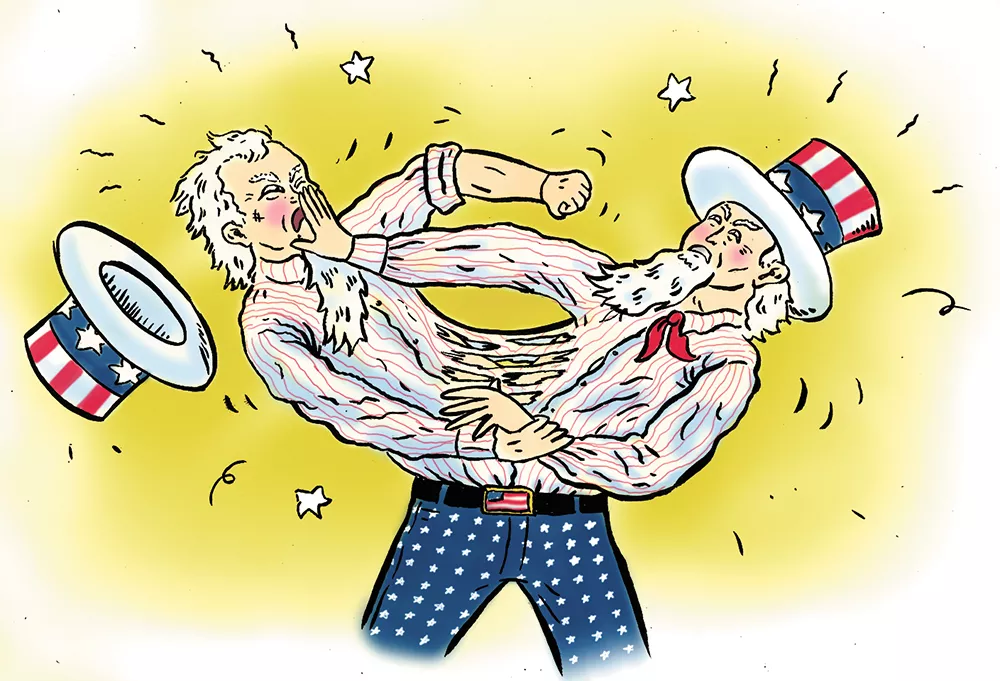Our nation's increasing partisanship over the past several decades hasn't been an accident. Rather, it's part of a long-term strategy to blow up government. Anti-government crusader Grover Norquist made this clear in interviews through the early aughts: "We are trying to change the tones in state capitals — and turn them toward bitter nastiness and partisanship."
Why would anyone want to make politics more nasty and partisan? For two reasons: First, partisanship has an anti-government bias. Second, it's an incredibly effective tool to build political power, especially for unpopular ideas. Let me expand on each those points.
Partisanship helps destroy government by pulling people apart. Government, at its core and its best, is about people coming together to solve problems that they couldn't solve on their own. It requires teamwork and community. Partisanship breaks down our sense of community by partitioning us into smaller, warring tribes. The focus shifts to the battles between those tribes, rather than the larger shared challenges we face.
Partisanship's capacity to build power comes from the tribalism that emerges. The value of potential solutions becomes increasingly separated from how they would work and what they would do, instead being judged by who is proposing the idea. This makes it easier to defeat popular ideas by having tribal leaders oppose them, and through the same method, easier to build support within a tribe for ideas that would be unpopular based on their merits alone.
Armed with this knowledge, Norquist and a small band of other extremist activists have spent decades building the infrastructure across the country to spread "bitter nastiness and partisanship." They built think tanks, political action committees, media networks, coalitions of funders and lobbying infrastructure — all aimed at dividing a nation, so that government would fail.
The Republican establishment initially rejected these impulses. They weren't against government, but rather had a different philosophy about how to make it leaner, and work more effectively and efficiently. However, as the power of partisanship to win elections and stop policies they disagreed with became increasingly apparent, Republicans eagerly jumped on board.
Partisanship is a powerful force — as it grows, it requires ever more demonstrated loyalty to one's own tribe through opposition to the other. What Republicans helped build, they no longer control. They cannot make the compromises necessary to govern. Even Norquist, whose anti-government message to dramatically cut taxes has become the core issue of unity within the new Republican government, has found that he cannot gain traction for immigration reform — a policy that he believes is key to economic growth.
Meanwhile, Democrats have watched this partisan machine rise and seen the political power it is capable of generating. Their solution? Begin building their own infrastructure of think tanks, PACs and donor alliances aimed at increasing partisanship.
It's as if in Star Wars, the Rebel Alliance had witnessed the terror of the Death Star and instead of plotting how to destroy it, said, "We should build one of those, too!" The trouble with this strategy is the Death Star can only destroy planets; it can never save them.
Don't get me wrong: Democrats and their generally liberal allies could almost certainly use purposeful partisanship to regain the presidency and control of Congress. But the tactic will fail when it comes time to perform tasks beyond merely wielding power, and destroying the elements of government they dislike.
Successful governing requires cooperation, and in the American form, that has to extend beyond a single political tribe if we are to pass and implement meaningful, lasting solutions to our shared struggles.
It's time to stop building Death Stars, and begin to form the alliances needed to destroy them. ♦
John T. Reuter, a former Sandpoint City Councilman, has been active in protecting the environment, expanding LGBT rights and Idaho's Republican Party politics.


















